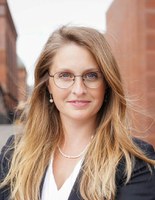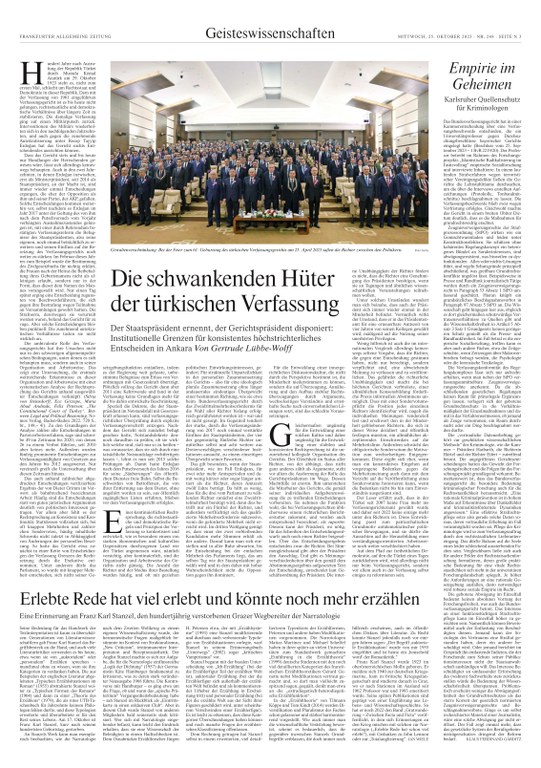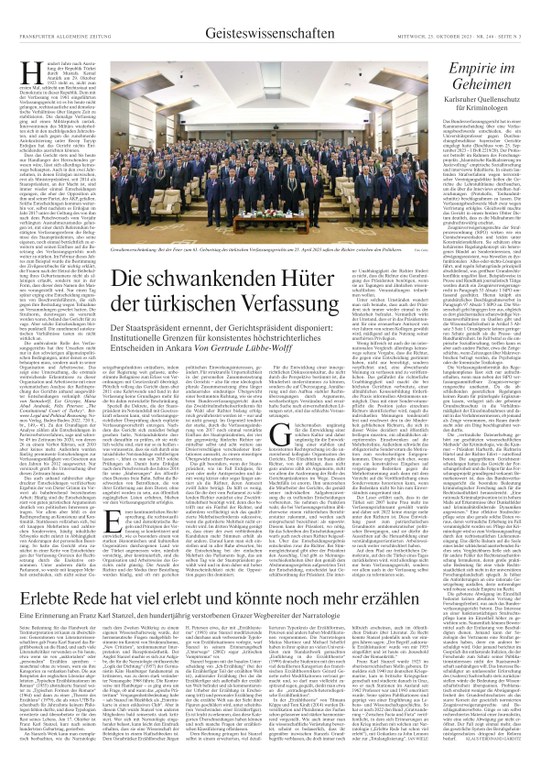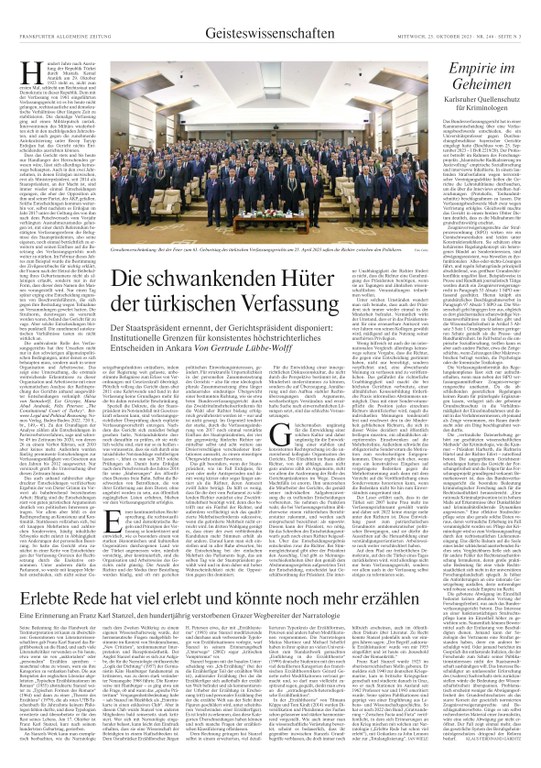Vergleichende Demokratieforschung und die Politischen Systeme Osteuropas
Buchrezension von Can Tecimer: "The Constitutional Court of Turkey. Between Legal and Political Reasoning"
Lesen Sie hier die im European Public Law Journal veröffentlichten Buchrezension von Cen Tecimer zum Buch "The Constitutional Court of Turkey. Between Legal and Political Reasoning" (herausgegeben von Prof. Dr. Silvia von Steinsdorff, Prof. Dr. Ece Göztepe, LL.M., Dr. Maria Abad Andrade, Dr. Felix Petersen).
Silvia von Steinsdorff und Ece Göztepe im F.A.Z. Einspruch Podcast zum Buch "The Constitutional Court of Turkey" zu Gast
Hören Sie hier (ab Minute 47:50) die Mitherausgeberinnen Silvia von Steinsdorff und Ece Göztepe im F.A.Z. Einspruch Podcast (Folge 279) im Gespräch über ihr Buch "The Constitutional Court of Turkey. Between Legal and Political Reasoning" (2023) sowie die am 24. Oktober 2023 in der F.A.Z. erschienenen Buchrezension von der ehemalige Bundesverfassungsrichterin Gertrude Lübbe-Wolff.
Politics Lecture Series, Lecture by Lydia Brashear Tiede: “Judicial Backsliding: A Guide to Collapsing the Separation of Powers”
- https://www.sowi.hu-berlin.de/de/lehrbereiche/osteuropa/politics-lecture-series-lecture-by-lydia-brashear-tiede-judicial-backsliding-a-guide-to-collapsing-the-separation-of-powers201d
- Politics Lecture Series, Lecture by Lydia Brashear Tiede: “Judicial Backsliding: A Guide to Collapsing the Separation of Powers”
- 2023-10-17T12:00:00+02:00
- 2023-10-17T13:00:00+02:00
- Wann 17.10.2023 von 12:00 bis 13:00
- Wo Institut für Sozialwissenschaften, Raum 002
- Name des Kontakts Institut für Sozialwissenschaften
-
iCal
We have a highly developed theoretical and empirical literature on judicial independence, but there is less research on judicial backsliding: the process through which duly-elected executives reduce court independence and thus collapse the separation of powers. We conceptualize judicial backsliding and argue that legislatures as well as executives are likely to be implicated in it. We test two contending theories: a dominant approach in the judicial literature that focuses on the degree of partisan support an autocratic executive can rely in the legislature; and an alternative approach that considers institutional constraints on the executive, including those emanating from legislative powers. Using a unique data set of judicial backsliding onsets and case examples, we find that in a sample of countries crossing an electoral democracy threshold, a decrease in horizontal constraints on the executive is highly related to onsets of judicial backsliding while the degree of partisan support in the legislature is generally not significant. The argument has wider implications for the study of judicial independence and for the role that legislatures and courts play in the backsliding process more generally.
17. Januar 2024, 18 Uhr: Verfassende Urteile: Eine Theorie des Rechts (Suhrkamp), Book Launch mit Prof. Dr. Sabine Müller-Mall (Technische Universität Dresden)
- https://www.sowi.hu-berlin.de/de/lehrbereiche/osteuropa/28-november-2023-18-uhr-verfassende-urteile-eine-theorie-des-rechts-suhrkamp-book-launch-mit-prof-dr-sabine-mueller-mall-technische-universitaet-dresden
- 17. Januar 2024, 18 Uhr: Verfassende Urteile: Eine Theorie des Rechts (Suhrkamp), Book Launch mit Prof. Dr. Sabine Müller-Mall (Technische Universität Dresden)
- 2024-01-17T18:00:00+01:00
- 2024-01-17T20:00:00+01:00
- Wann 17.01.2024 von 18:00 bis 20:00
-
iCal
Gerichte nehmen mit ihren Urteilen großen Einfluss auf Verfassungsentwicklungen. Wie aber können diese Urteile Verfassungen erweitern, verdichten oder verändern? Und was heißt es überhaupt, rechtlich zu urteilen? Um verfassende Urteile über ihre Rechtsförmigkeit zu erklären, rekonstruiert Sabine Müller-Mall in ihrem scharfsinnigen Buch Verfahren juridischen Urteilens. Sie entwirft nicht nur eine grundlegende Perspektive auf den Zusammenhang von Recht und Konstitutionalisierung, sondern auch eine Theorie des Rechts, die das Urteilen zum Ausgangspunkt nimmt. Die Veranstaltung ist eine Kooperationsveranstaltung mit dem Kolloquium Theorie und öffentliches Recht und ist Teil der Reihe LSI Berlin Book Launch.HU Berlin, Juristische Fakultät, Unter den Linden 9, Raum E25 und Stream, Anmeldung: law-and-society@hu-berlin.de
Mehr Informationen hier.
Buchrezension von Esra Demir-Gürsel: "The Constitutional Court of Turkey. Between Legal and Political Reasoning"
Lesen Sie hier die in der Zeitschrift für Rechtssoziologie veröffentlichten Buchrezension von Esra Demir-Gürsel zum Buch "The Constitutional Court of Turkey. Between Legal and Political Reasoning" (herausgegeben von Prof. Dr. Silvia von Steinsdorff, Prof. Dr. Ece Göztepe, LL.M., Dr. Maria Abad Andrade, Dr. Felix Petersen).
"Kippt die Gewaltenteilung?", Prof. Dr. Silvia von Steinsdorff im Podcast "Wortwechsel" von Deutschlandfunk Kultur
Der Wortwechsel ist das Diskussionsforum bei Deutschlandfunk Kultur – mit interessanten Gesprächspartnern und aktuellen Themen. Die Sendung widmet sich dabei allen Fragen des gesellschaftlichen Lebens. Aktuelle Folge zu "Kippt die Gewaltenteilung?": Wie soll die Ampel-Regierung die Schuldenbremse einhalten und gleichzeitig die Energiewende schaffen? Das Haushaltsurteil des Bundesverfassungsgerichts und das Klima-Urteil des Obersten Verwaltungsgerichts machen es der Politik schwer. Den Link zur Folge finden Sie unter "read more".
Den Link zur Folge "Kippt die Gewaltenteilung?" des Podcasts "Wortwechsel" von Deutschlandfunk Kultur finden Sie hier.
Erste Sitzung des Lesekreises Klima und Recht zu "Procedure and Substance in International Environmental Law" von Jutta Brunnée (Toronto)
- https://www.sowi.hu-berlin.de/de/lehrbereiche/osteuropa/erste-sitzung-des-lesekreises-klima-und-recht-zu-procedure-and-substance-in-international-environmental-law-von-jutta-brunnee-toronto
- Erste Sitzung des Lesekreises Klima und Recht zu "Procedure and Substance in International Environmental Law" von Jutta Brunnée (Toronto)
- 2024-02-06T19:00:00+01:00
- 2024-02-06T20:30:00+01:00
- Wann 06.02.2024 von 19:00 bis 20:30
- Wo online
- Name des Kontakts Ines Reiling
-
iCal
Dies ist die erste Sitzung des Klimakreises. Gelesen wird ein Auszug aus dem Buch "Procedure and Substance in International Environmental Law" von Jutta Brunnée (Toronto). Birgit Peters (Trier) wird es im Beisein der Autorin vorstellen. Susanne Baer wird zur Begrüßung sprechen.
Bei Interesse melden Sie sich gerne bei Ines Reiling (ines.reiling@hu-berlin.de), um den Link zu erhalten.
Constitutional Challenges – Judging under Pressure, with Daphne Barak-Erez (Supreme Court of Israel), Ivana Jelić (ECtHR), Andreas Paulus (Former Justice of the German Federal Constitutional Court) and Daniela Salazar Marín (Constitutional Court of Ecuador)
8-9 February 2024: A two-day conference discussing the urgent challenges facing constitutional democracies today, including democratic decay, persistent inequalities and the climate crisis. Co-hosted by the Centre for Fundamental Rights at the Hertie School, the University of Münster and the Integrative Research Institute Law & Society at Humboldt University Berlin.
- https://www.sowi.hu-berlin.de/de/lehrbereiche/osteuropa/constitutional-challenges-judging-under-pressure-with-daphne-barak-erez-supreme-court-of-israel-ivana-jelic-ecthr-andreas-paulus-former-justice-of-the-german-federal-constitutional-court-and-daniela-salazar-marin-constitutional-court-of-ecuador
- Constitutional Challenges – Judging under Pressure, with Daphne Barak-Erez (Supreme Court of Israel), Ivana Jelić (ECtHR), Andreas Paulus (Former Justice of the German Federal Constitutional Court) and Daniela Salazar Marín (Constitutional Court of Ecuador)
- 2024-02-08T17:00:00+01:00
- 2024-02-09T17:00:00+01:00
- 8-9 February 2024: A two-day conference discussing the urgent challenges facing constitutional democracies today, including democratic decay, persistent inequalities and the climate crisis. Co-hosted by the Centre for Fundamental Rights at the Hertie School, the University of Münster and the Integrative Research Institute Law & Society at Humboldt University Berlin.
- Wann 08.02.2024 17:00 bis 09.02.2024 17:00
-
iCal
Constitutionalism faces significant challenges today. On the one hand, respect for rule of law and the independence of judiciaries are in decline. On the other hand, constitutional, supreme, and human rights courts are increasingly called upon to address major societal challenges of our times, such as persistent inequalities and the climate crisis.
Bringing together supreme and constitutional court judges and scholars from around the world in Berlin, this international conference creates a unique space for in-depth conversations on how courts and judges do, can and should address these challenges.
Jointly hosted by the Hertie School's Centre for Fundamental Rights and the University of Münster, in cooperation with the Integrative Research Institute Law & Society (LSI) at Humboldt University, the conference is convened by Prof. Başak Çalı (Hertie School), Prof. Cathryn Costello (University College Dublin and Hertie School) and Prof. Nora Markard (University of Münster). It honours the return of former Federal Constitutional Court Justice Prof. Susanne Baer to academia.
The conference will be held on two days:
Thursday, February 8, 2024, Public event: Judging in a Constitutional Democracy
A distinguished panel of apex court judges will discuss the challenges of judging in a constitutional democracy.
We are honoured to welcome Justice Daphne Barak-Erez, Supreme Court of Israel, Judge Ivana Jelić, European Court of Human Rights, Prof. Andreas Paulus, Former Justice of the German Federal Constitutional Court and Justice Daniela Salazar Marín, Constitutional Court of Ecuador, for a conversation chaired by Professors Başak Çalı (Hertie School) and Nora Markard (University of Münster).
The event will take place at the Humboldt University Berlin, Faculty of Life Sciences, Hörsaal 10, Invalidenstrasse 42 (View Campus Map).
Registration: Please register here to attend.
See full programme | Learn more about the speakers
Friday, February 9, 2024, Symposium: Current Challenges for Constitutional Law
The full-day symposium will start with a keynote lecture by Prof. Catharine A. MacKinnon (University of Michigan and Harvard University), followed by three roundtable conversations with judges and scholars addressing pressing constitutional challenges: Persistent Inequalities, Democratic Backsliding, and the Climate Crisis.
Registration is required. Please note that the number of available slots is limited. Registrants who submit the registration form before 31 January will be informed by 2 February whether they may attend the event on site.
The conference will be live-streamed.
Research Lounge "Krieg und Frieden"
- https://www.sowi.hu-berlin.de/de/lehrbereiche/osteuropa/research-lounge-krieg-und-frieden
- Research Lounge "Krieg und Frieden"
- 2024-02-14T16:30:00+01:00
- 2024-02-14T19:30:00+01:00
- Wann 14.02.2024 von 16:30 bis 19:30
- Wo Senatssaal, Unter den Linden 6, 10117
- Web Externe Webseite besuchen
-
iCal
Research Lounge - eine Veranstaltungsreihe des Vizepräsidenten für Forschung
Die Research Lounge versteht sich als akademische Vernetzungsveranstaltung. Ziel ist es, die Vielfalt der disziplinären Zugänge, Forschungsperspektiven und Expertisen an der Humboldt-Universität, aber auch der anderen Berliner Universitäten in Austausch miteinander zu bringen.
Wissenschaftler:innen verschiedenster Karrierestufen sind jeweils eingeladen, ihre Forschungsprojekte in Form kurzer Impulse vorzustellen. Anschließend wird es im Rahmen eines World Cafés für alle Teilnehmenden die Möglichkeit zum kollegialen thematischen Austausch geben.
Anmeldung unter: vpfrefer@hu-berlin.de
PROGRAMM
16:30−16:40 Uhr | Begrüßung
Prof. Dr. Christoph Schneider
Vizepräsident für Forschung
Prof.in Dr.in Silvia von Steinsdorff
Prodekanin für Forschung, Kultur-, Sozial- und Bildungswissenschaftliche Fakultät
16:40−17:00 Uhr | Gefährdete Forschende
Neda Soltani
Abteilung Internationales
Mohammad Haroon Mutasem, LL.M., PhD
PSI-Fellow, Juristische Fakultät
17:00−17:45 Uhr | Impulsvorträge
PD Dr. Daniel Bultmann
„Die Rolle sozialer Ungleichheit in der Struktur und in der Reintegration bewaffneter Gruppen“
Institut für Asien- und Afrikawissenschaften
Prof.in Dr.in Gwendolyn Sasse
„Empirische Sozialforschung im Krieg“
Institut für Sozialwissenschaften, Zentrum für Osteuropa- und internationale Studien
Prof. Dr. Florian Jeßberger
„(Straf)Recht als Reaktion auf Krieg und Systemunrecht“
Juristische Fakultät
Dr.in rer. nat. Ricarda Evens
„Die unsichtbaren Wunden: Psyche in Krisenzeiten“
Institut für Psychologie
PD Dr.in Julia Barbara Köhne
„Soldatische Kriegshysterie. Internationale Kinematographien in der Militärpsychiatrie des Ersten und Zweiten Weltkriegs“
Institut für Kulturwissenschaft
Prof. Dr. Alan Akbik
Institut für Informatik
Nicole Kunkel
„The Terminator fighting for just peace? An ethical evaluation of lethal autoregulative weapons systems" / "Der Terminator im Einsatz für den gerechten Frieden? Zur ethischen Bewertung autoregulativer Waffensysteme“
Theologische Fakultät
17:45−18:45 Uhr | World Café Session
18:45−19:30 Uhr | Offenes Netzwerken und Ausklang
Call for Proposals (Deadline extended: Feb. 18, 2024): Historical Past and Contemporary Propaganda in the Global Context
Call for Proposals (Deadline extended: Feb. 18, 2024)
Please submit your extended abstract (500 words in English) to: gagarincenter@smolny.org
For more information see here.
Historical Past and Contemporary Propaganda in the Global Context
Conference: June 7-8 2024: Berlin, Germany
The Gagarin Center at Bard College, the Smolny Beyond Borders Initiative at Bard College Berlin and Center for Comparative Research on Democracy of Humboldt Universitaet zu Berlin are soliciting proposals for the international conference Historical Past and Contemporary Propaganda in the Global Context to be held at Humboldt Universität zu Berlin (Germany), on the June 7-8, 2024.
Memory studies is an established academic discipline; however, the issue of propaganda poses a new set of research questions particularly in relation to the problem of the operational character of memory and propaganda. They mutually operationalize the mechanisms of instrumentalization of history through practices of commemoration and forgetting across different institutional, geographical and social contexts.
As a modern communication tool, propaganda became well known as a 20th century phenomenon after the First World War, when it transitioned from a practice predominantly associated with warfare to the social milieu of promotion and public relations. Paul Ruterford (2000) considered propaganda as ‘both the language and the instrument of power’, he also argued that it is hard to separate and distinguish propaganda from marketing, public relations and advertising. Nancy Snow (1998) and Patricia Aufderheide (2007) consider propaganda in relation to its powerful sponsors: official state institutions, large organizations and corporations. But despite the volume of research devoted to propaganda, the connection between memory utilization and propaganda has yet to be systematically covered. This conference intends to fill the gap in addressing how memory plays a role in understanding propaganda.
Memory has always been an important aspect of political history as a way in which history is preserved and obfuscated. At the same time, procedures of commemoration and forgetting are applied together as a propaganda tactic. The conference and proposed volume will focus on the examination of the complex structure of memory and propaganda as part of the agenda of the instrumentalization of history during the last century in the global context. The purpose of the conference is to bring together scholars working on issues of memory and propaganda in order to discuss their work and prepare a special issue of a journal or a volume of essays to be published with a leading academic publisher in 2025. The longer-term objective is to build a network of scholars in order to develop research and teaching in this field, leading to funding bids, joint publications, etc.
Conference:
We are seeking proposals related to different aspects of the contemporary practice of memory and propaganda in the global context.
The conference will serve as a platform for debating various approaches to memory and propaganda in the global context, including Europe, Asia, and Americas. There are two main questions that should be discussed in all proposals/papers:
– What kinds of characteristics (if any) distinguish the politics of propaganda and the politics of history?
– Which factors beyond political regimes determine how propaganda has been implemented in the past?
We envisage the planned special issue/volume will be structured around these five areas:
1. Propagandistic use of memory during war and military conflicts:
Propaganda may be considered a competition to see whose story triumphs in the crowed global theater of influence. This section will concentrate on the issue of imaginary victories as well as tools and techniques ofthe production of military victories. Propagandistic utilization of claims for personal and collective safety together with the rhetoric of commemoration influence the decision-making process and become a burden of securitization (in terms of Copenhagen school of security studies).
2. Propaganda, memory and the political process:
Propaganda has always been an influential instrument of political life across various political regimes and contexts including manipulating history for political debate and argument. On the other hand, propaganda is part of memory constructing, since mnemonic constructs use various tools of propaganda. Politics and memory mutually influence each other. For example, in this context the idea of ‘patriotism,’ which has been discussed in political and intellectual communities, is part of historical discourse as well a propagandistic concept, since patriotic education is a goal of the state. The particular question in this part of the project will be on the utilization of memory in imperial/regional propagandas.
3. Media, propaganda and ideologies:
This section of the volume will investigate how media (national and transnational, traditional and digital) exploited mnemonic narratives for propaganda goals during the 20th century. Propaganda relies on centralized information control, private or state monopoly, and such centralization of information is a prerequisite for any analysis of cultural and historical forms of the interinfluence between memory, media and propaganda including digital media and artificial intelligence as a contemporary tools of media functioning.
4. Academic and teaching practices:
The humanities is the academic sphere which is most involved in the constructing of senses. Professional history-writing, literature-studies as well as the education system and practices are instruments for manipulation and using collective memory for propaganda goals. We are seeking papers analysing propaganda in academic and educational practices in various cultural and geographical contexts such as the humanities and social sciences, professional and public knowledge, schools and university education systems, as well as various levels of such utilization – institutional, individual, ideological etc.
5. The Arts:
Collective memory, especially memories of struggle, conflict, and terror are exploited today to impact /manipulate our interpretations of the past and present and this makes it a fruitful instrument of propaganda.In this section, we will explore how policies of commemoration/forgetting/nostalgia are represented in official and informal art practices aiming to mobilize people. Traditional states attempted to commemorate in the form of monuments, but today we increasingly witness all kinds of society-driven efforts to “counter-commemorate” traumatic experiences through a variety of art forms. This tendency represents the symbolic exercise of mobilizing the present through diverse commemorative practices and is used as an instrument of propaganda.
All of these areas overlap. However, for future planning purposes, please indicate in your proposal which area you think your research best covers.
A limited number of travel grants to cover the transportation and accommodation of conference participants is available on a competitive basis.
Please send your proposals to: gagarincenter@smolny.org
If you have any questions, please contact Ertug Tombus ertug.tombus@hu-berlin.de or Victor Apryshchenko vapryshchenko@bard.edu’
ANTICIPATED TIMELINE
Extended abstracts (500 words in English) are due on February 18, 2024
Draft essays (3,000-4,000 words in English) are due on May 12, 2024
Conference June 7-8, 2024
Final papers are due on October 15, 2024
Submission to publisher February 15, 2025
Buchrezension von İlker Gökhan Sen: "The Constitutional Court of Turkey. Between Legal and Political Reasoning"
Lesen Sie hier die in Verfassung und Recht in Übersee veröffentlichten Buchrezension von İlker Gökhan Sen zum Buch "The Constitutional Court of Turkey. Between Legal and Political Reasoning" (herausgegeben von Prof. Dr. Silvia von Steinsdorff, Prof. Dr. Ece Göztepe, LL.M., Dr. Maria Abad Andrade, Dr. Felix Petersen).
Neue Veröffentlichung von Prof. Dr. Silvia von Steinsdorff: Critical Acceptance of an Unloved Constitution. The Russian State Duma in the 1990s
Hier ist der Link zum neu veröffentlichten Buchkapitel von Prof. Dr. Silvia von Steinsdorff in der neuesten Ausgabe des Buches "Russische Geschichte": https://brill.com/view/journals/ruhi/50/1-2/article-p112_6.xml
Werkstattgespräch "Eine juristische Resilienztheorie? Ein Gedankenspiel" mit Dr. Anne Dienelt (Universität Hamburg)
- https://www.sowi.hu-berlin.de/de/lehrbereiche/osteuropa/werkstattgespraech-eine-juristische-resilienztheorie-ein-gedankenspiel-mit-dr-anne-dienelt-universitaet-hamburg
- Werkstattgespräch "Eine juristische Resilienztheorie? Ein Gedankenspiel" mit Dr. Anne Dienelt (Universität Hamburg)
- 2024-04-30T18:15:00+02:00
- 2024-04-30T19:45:00+02:00
- Wann 30.04.2024 von 18:15 bis 19:45
- Wo HU Berlin, Juristische Fakultät Raum E25 und Online, Anmeldung: law-and-society@hu-berlin.de
- Name des Kontakts Lennard Gottmann
-
iCal
Während Resilienz in vielen wissenschaftlichen Disziplinen seit Jahrzehnten als Konzept oder zumindest Begriff etabliert ist, wird es erst seit kurzer Zeit auch in der deutschen Rechtswissenschaft diskutiert. Dabei sind Krisen, Störungen und Katastrophen, deren Bewältigung Inhalt von Resilienzdiskursen ist, auch in der Rechtswissenschaft ein häufiger Forschungsgegenstand. Nichtsdestotrotz mangelt es der juristischen Resilienzforschung aktuell an einem ausreichend reflektierten Resilienzverständnis. Häufig wird die Begrifflichkeit ohne Reflexion möglicher Lesarten genutzt; häufig wird dabei nicht klar, ob es bspw. um Robustheit oder Anpassungsfähigkeit geht. Gegenwärtig liegt der Fokus der juristischen Resilienzdebatte auf der Resilienz von Recht und Gesetzen, wie dem Grundgesetz.
Dieser Vortrag enthält ein Plädoyer für eine Perspektiverweiterung, um das Potential des interdisziplinären Resilienzdiskurses auch in der Rechtswissenschaft vollumfänglich zu nutzen. Eine externe Resilienzperspektive erlaubt eine Betrachtung des Rechts als Werkzeug zum Resilienzaufbau und -ausbau des (Rechts)Staats, und gibt zudem der systemischen Komplexität von Recht und Staat in krisenhaften Zeiten mehr Raum. Diese ersten Gedanken sollen den Weg zu einer juristischen Resilienztheorie bereiten.

Dr. Dienelt forscht aktuell im Zuge ihres interdisziplinären Habilitationsprojekts am Institut für Internationale Angelegenheiten der Universität Hamburg zu Fragen von Resilienz und Staat(en). Sie untersucht rechtsvergleichend die Reaktionen und Mechanismen von Staaten, unter anderem hinsichtlich der Klimakrise, Pandemien und anderer Ausnahmesituationen.
Diese Veranstaltung ist Teil der Reihe Werkstattgespräche: Nichtjuristische Zugänge und Methoden zur Erforschung des Rechts und ist eine Kooperationsveranstaltung mit dem DFG-Projekt Recht - Geschlecht - Kollektivität.




